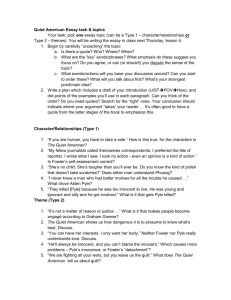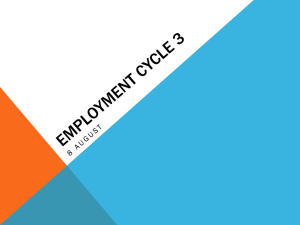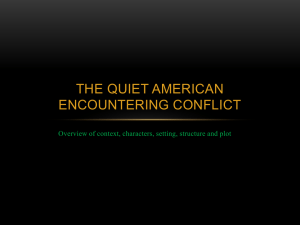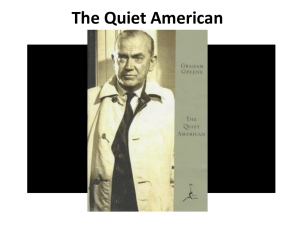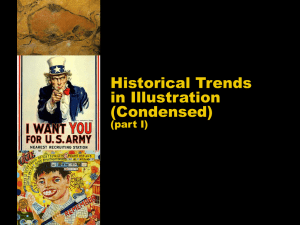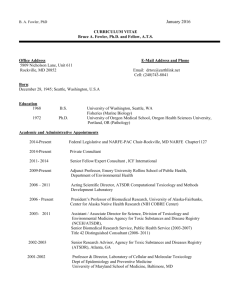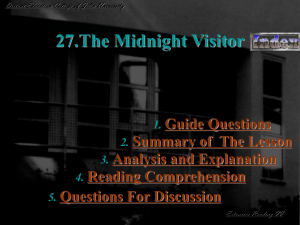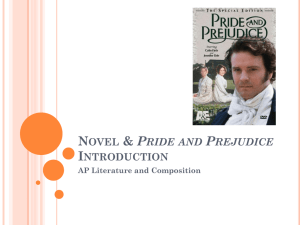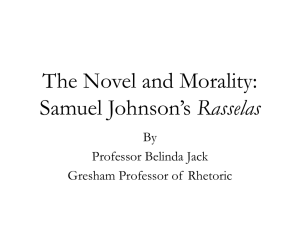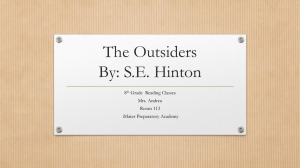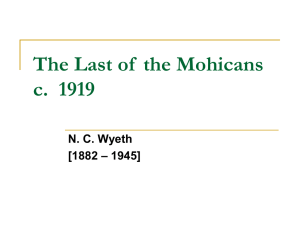The Quiet American- Characters - English-Units 3 & 4-BCH
advertisement
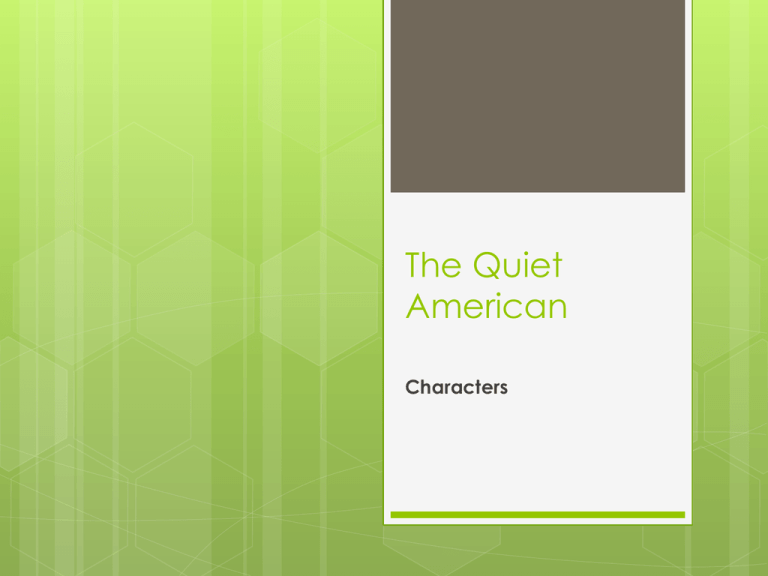
The Quiet American Characters Thomas Fowler Fowler is the cynical narrator of the novel who has made a career out of being a bystander. He is so detached from events around him, he even disparages fellow journalists, whom he refers to as ‘correspondents’. Fowler has left his wife, Helen, in England, after being unfaithful to her and then being unable to reconcile with her. He has come to a country in the middle of a war, where he as an English man is regarded as neutral. This is very much a symbol of how he regards himself. He is in a relationship with the much younger and very attractive Phuong, and although he does not see this in himself, he regards her very much like a possession; he is very surprised when she exercises her own free will and knocks Pyle back. Fowler is an avowed atheist, although as a narrator he is often preoccupied with religion and religious thought. This is a part of the cynicism which is a fundamental part of his character, in this way his name Thomas, from doubting Thomas, is well deserved. He believes that the only absolute thing that can be relied upon in death - as the final annihilation of self and ego - and writes that he welcomes it; however, when faced with death, he abandons this precept, like so many of his other ideals, and is afraid. Pyle is the character after whom this novel is named. He is in many ways the complete antithesis to the narrator - young and idealistic where Fowler is old and cynical. He is often characterised as innocent, like a virgin and it is therefore ironic that the name Alden means ‘old and wise’. Pyle is keen to get involved, with the war, with Phuong, but he has a great need to ‘play fair’; it is this last characteristic that gives the novel some of its humour - he wants to marry Phuong and therefore steal her from Fowler, but he wants to be upfront and open about his intentions. Fowler and he discuss Phuong’s future and their involvement, but in the end, of course, it is Phuong herself who decides her own future; both Pyle and Fowler are surprised by this, and it demonstrates how caught up Pyle is in his ideal view of the world, and how little bearing on reality it has. Pyle idealistically gets involved in plastic explosives (the plastic representing his new world); but in his naiveté detonates the bomb in a market place, killing and maiming women and children. His astonishment and desire to clean his bloodied shoes is contrasted with the grieving mother who covers her dead infant with her hat. Once again, he is clean, innocent of his own actions, and it is for this reason that Fowler decides Pyle is too innocent, naive to live. Alden Pyle Phuong is the centre of the love triangle she is objectified by both Pyle and Fowler. Pyle thinks of her as unable to make her own decisions, childlike, and is challenged in this view by Fowler who sees her much more realistically. However, for Fowler she is an escape – she prepares the pipes he is addicted to as an escape from emotional reality, and even the colour of her skin is the same amber as the opium resin. Phuong She cannot read English and is thus completely separate from Fowler’s life as a man of letters. The meaning of Phuong’s name is given to us on the first page o the novel, and it is clear that she is the only one who does rise from the wreckage of the world around them, she is not destroyed by those around her. Miss Hei The sister of Phuong, she is interested only in the material comfort of her sister and herself. She acts for Pyle when she sees that he is in a position to marry Phuong and can therefore be seen as the antagonist in Fowler’s drama. However, it is clear that for her and Phuong life is not a gentle and forgiving existence. Without a secure relationship, these women do not have many options. The old, Vietnamese way of living is no longer viable; the life of Vietnam as a French colony is fast coming to an end, and these women need to fend for themselves, using the talents (beauty) that they have. Compared with the troubles that face the men in the novel, Phuong lives from day to day, a victim of the world around her who refuses to be a victim. Vigot The French detective in charge of investigating Pyle’s death, Vigot is portrayed as a sensitive man of learning. He is a minor character in the novel, appearing in Books 1, 3 and 4. Although Vigot is ‘not altogether sorry’ that Pyle has been killed, he is a man with a vocation (again, in contrast to Fowler who considers that he has a job), a man who knows what his purpose in life is - to find out the truth. In this way, Fowler is sorry to have lied about his involvement with Pyle’s death, because he knows that Vigot is representative only of the truth, a concept that Fowler himself struggles with. Mr Heng The person ultimately responsible for the death of Pyle, he makes Fowler aware of the extent of Pyle’s activities. Heng is the man behind Mr. Chou, who is supposed to have a position of power; in turn Heng is supposed to have friends ‘like rats’ supporting him. It is Heng who tells Fowler, ‘Sooner or later,...one has to take sides. If one is to remain human.’ The inference is clear: Fowler is judging Heng and his associates as rat-like, animalistic, but they are concerned with the human war in way that Fowler is not. It is Fowler who is the animal, and not Heng. Captain Trouin A very minor character who appears in Part 3, Trouin is a pilot who drops bombs and napalm on villages while claiming that the risk to himself is as great as it is to the village. He is dismissive of Fowler’s detachment from the situation; he knows that the war can’t be won, but he is a professional soldier. Trouin takes Fowler to a prostitute, and Fowler is impotent: a contrast to Trouin.
